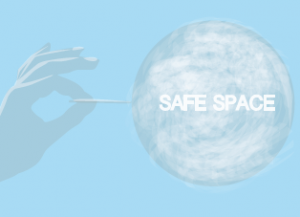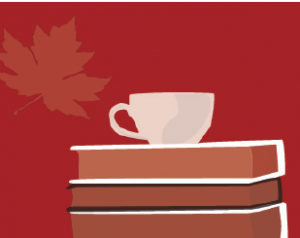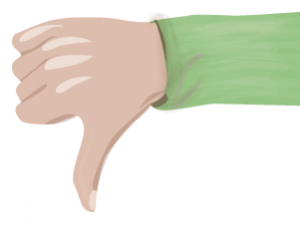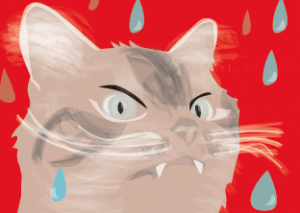UFV already safe

On March 2, a message of “TRUMP 2016” appeared in chalk on a sidewalk at Atlanta’s Emory University. In response, students told school officials that the chalk messages made them feel “afraid.” Meanwhile, University of Michigan students felt so unsafe by pro-Trump chalk messages that they called the police.
When did university students become so over-sensitive and emotionally fragile? Universities have historically stood as bastions of free expression and forums for open discourse, but this is seemingly no longer the case. Students now demand feelings-protection and safe spaces to shield themselves from opinions they disagree with. That innocuous political speech like “TRUMP 2016” could actually make students feel unsafe is particularly concerning.
Even at UFV, a few students feel unreasonably unsafe. A recent initiative proposed by UFV to create a rainbow sidewalk was criticized by some as creating a false sense of safety for LGBT students. But here’s the thing: UFV is already a very safe place, with a distinct Harassment Prevention Policy in place to help protect students from bullying and discrimination. That some students demand further protection from opinions that hurt their feelings is not only outrageous, but also unfortunately typical of the modern university experience.
Terrill Smith
Canadian Literature kicks ass

If Canadian authors don’t get a bad rap, they’re ignored by the majority of secondary school English classes and mainstream bookstores in Canada. For example, I recently picked up Michael Ondaatje’s The Collected Works Of Billy The Kid. I’ve only read the first couple of paragraphs, but holy shit was I floored by the raw, unflinching vividness and immediacy of Ondaatje’s imagery.
“Tom O’Folliard screaming out onto the quiet Fort Sumner street, Christmas night, walking over to Garrett, no shoulder left, his jaws tilting up and down like mad bladders going. Too mad to even aim at Garrett. Son of a bitch son of a bitch, as Garrett took clear aim and blew him out.”
Guys, Michael Ondaatje’s work is a freaking godsend to the literary world. So is Margaret Atwood’s, and Matt Rader’s, and countless others.
Nowadays, teachers have to struggle to prove to students that reading is cool, and then that poetry is cool. They do this by showing students stuff like William Butler Yeats’ “The Second Coming,” all ominous, all grandiose.
Yeats is cool. But we should focus also on the seemingly unending wealth of creativity that’s come from our own backyard.
We should promote Canadian literature, not just because it facilitates our identity, but also because Canadians write some of the most kick-ass lit out there.
Martin Castro
The pain of being an overworked student

I hate having to work. Which is why it’s depressing that I work so much. I wish I was a lazy millennial. But instead I have two jobs, school work, volunteering, and every now and then I try to maintain a social life. And I wish I could just cut all of that out and live, sedentary. I’m constantly checking my schedule and the upkeep and communication leads to stress, anxiety, and utter terror that I’ll forget something. It’s brutal balancing shifts at work, classes, more work, meetings, online meetings, phone meetings, Skype, Facebook, telegram, whatever. It’s too much work, too much pressure.
But here’s the thing: even though the amount of work freaks me out, I still wouldn’t trade it for anything else in the world. I like my job(s), I like my classes, and I like all the things I do outside of those things. But I recognize the fact that I need to cut back on something, and I’m sure other students have to make that same decision too. I think next semester I’ll only work one job, and maybe volunteer more casually, rather than try to juggle 30 different things over the course of a week.
Glen Ess
L.A., N.Y., and B.C.

Los Angeles. New York. Los Angeles. New York. And sometimes Texas.
These are the only places that exist. When online articles talk about what to wear for what season, what kinds of foods you ought to eat, and how to take advantage of your surroundings in general, they tend not to mention how to deal with massive hills and constant rain. Advice is not designed for British Columbia.
And movies and books tend to be set in L.A. or N.Y., if not in a fictional small town. The mythology of these places grows exponentially as media set in these cities inspires further media set in these cities. I find this disappointing, too, because I never get to see stories about my own experience. Then, when things are set in Vancouver, it tends to feel forced, like “Why not just set it in New York where the mythology happens?”
This is the bias towards these places at work. How to fight it? Tell more stories about this place, and find a way to make its setting integral. Talk about how to live in a city on the side of a mountain under endless rain. Los Angeles, New York, Los Angeles, and New York can shove it.
Alex Rake


